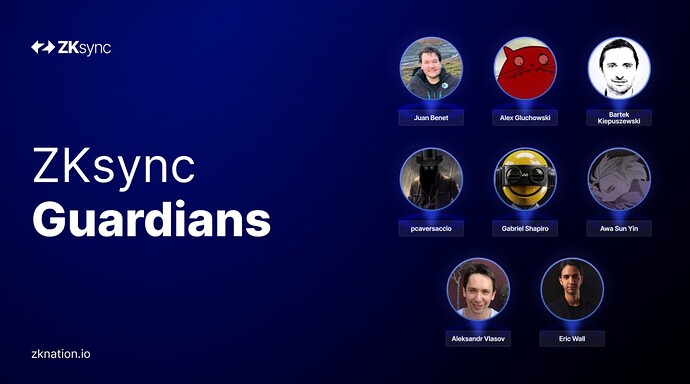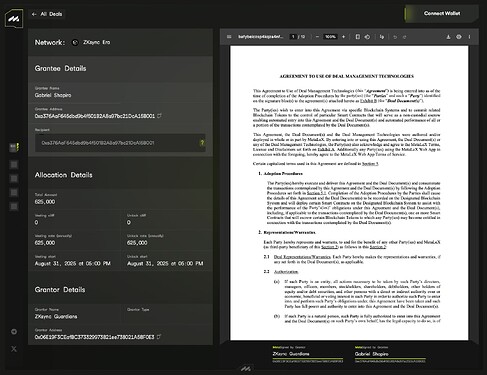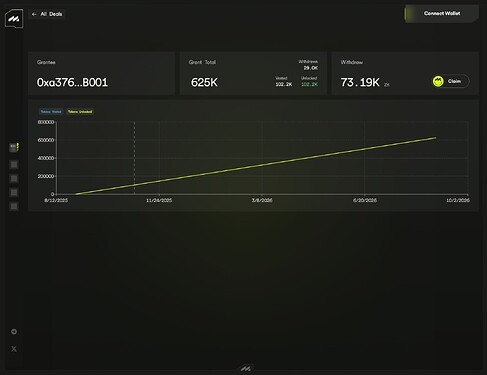ZKsync Guardians One Year Report
| Item | Description |
|---|---|
| Reporting Period: | September 2024 – September 2025 |
| Prepared For: | ZKsync Token Assembly |
| Prepared By: | ZKsync Guardians |
| Date: | October 2025 |
1. Executive Summary
The ZKsync Guardians were established in September 2024 as an independent body within the ZKsync governance system. Throughout the last 12 months, Guardians have participated in multiple emergency actions and ensured veto methods are working as expected. Most importantly, Guardians have ensured ZK Credo values are placed at the forefront of ZKsync protocol design decisions and token programs.
The Guardians’ mandate is to uphold the values of ZKsync and support ZKsync’s security. To date, no onchain interventions have been required; advocacy, deterrence, and verification mechanisms are functioning as intended.
The Guardians’ actions are preventive by design: they maintain credible readiness and reinforce system accountability through active monitoring, rehearsals, and transparency improvements. This report shows how Guardians have played a key role in governance stability throughout the reporting period.
2. Mandate and Composition
The ZKsync Guardians consist of eight (8) individuals. Together, they are responsible for:
- Ensuring ZK Credo values are consistently at the forefront of ongoing protocol design, critical interventions, and token supply allocations.
- Deterring threats by being able to propose and execute a veto on governance proposals that are abusive, malicious, or could otherwise adversely affect ZKsync or its governance system.
- Evaluating emergency interventions against the values and vision of the ZK Credo.
Membership
ZKsync Guardians were appointed by the ZKsync Association at the launch of the ZKsync Governance system. Participants were selected based on multiple criteria, such as personal visions of blockchain technologies, advocacy, technical knowledge, and entrepreneurship experience. Members include the following eight individuals:
- Juan Benet: Juan Benet is the inventor of IPFS, a protocol revolutionizing the web, and Filecoin, the world’s largest decentralized storage network. As the founder of Protocol Labs, Juan leads innovation in technologies like web3, AI, BCI, and more. A Stanford Computer Science graduate, he’s passionate about improving the internet and building more robust foundations for the digital future.
- Alex Gluchowski: Alex is a software architect with over 15 years of experience in engineering and startups. He is the co-inventor of ZKsync and currently serves as the co-founder and CEO of Matter Labs, where he leads a talented team focused on addressing blockchain scalability challenges using zero-knowledge proofs. Alex’s passion lies in using technology to advance personal freedom, self-ownership, and decentralization.
- Bartek Kiepuszewski: Bartek is the co-founder of L2Beat, an independent research venture that focuses on deep technical risk analysis of Ethereum scalability solutions. Bartek brings over 20 years of experience in the computer industry (both academic and industrial environments) working on complex IT projects. Prior to L2Beat, Bartek served as an architect at MakerDAO.
- pcaversaccio: pcaversaccio is a dedicated open-source engineer, security professional, and entrepreneur deeply immersed in the Ethereum ecosystem. As the leader of SEAL 911, an emergency hotline, he addresses critical incidents with a focus on security. His technical contributions include active development on the Vyper compiler and its associated libraries, with notable achievements such as identifying a bug in the ZKsync Era Vyper compiler. Most significantly, he is the author of “The Ethereum Cypherpunk Manifesto”, a testament to his unwavering commitment to privacy, security, and the principles of censorship resistance.
- Gabriel Shapiro: Gabriel is the founder of MetaLeX, a company devoted to cybernetic law solutions co-developed by devs and lawyers to fuse autonomous software with legal systems. Inspired and empowered by Bitcoin and Ethereum, he is pioneering the development of autonomous legal systems that operate independently of nation-states. Previously, Gabriel served as the general counsel at Delphi Labs and co-founder and head of legal engineering at ZeroLaw.
- Awa Sun Yin: Awa develops privacy infrastructure and is co-founder of both Anoma and Namada. At Anoma, Awa has worked to rethink decentralized application and infrastructure from first principles and introduces a new category of intent-centric protocols. In her work with Namada, Awa has brought cypherpunk values to the forefront by developing multi-chain privacy solutions and asset-agnostic data protection.
- Aleksandr Vlasov: Alexandr is a co-founder and the head of R&D of Matter Labs. A nuclear physicist with a master’s degree in high-energy physics and a doctorate in electrical engineering, he has extensive experience working with blockchain scaling solutions.
- Eric Wall: Eric Wall is a co-founder of Taproot Wizards and an engaged member of the Bitcoin and Ethereum communities. As a startup founder, engineer, investor and blogger, he has been an early proponent of rollup technology, ZK, and modularity. Eric also serves on the board of the Starknet Foundation.
A full list of signer addresses and ZKsync Guardian entity details is maintained in Schedule 4 of the ZKsync Governance Procedures.
3. ZKsync Governance Participation
ZKsync Guardians reviewed 21 unique proposals from September 2024 to September 2025. None were found to be malicious or in conflict with ZK Credo values. The absence of veto actions reflects strategic advocacy and deterrence at work. The credible oversight of Guardians has helped maintain adherence to shared standards without requiring direct intervention.
The review process worked as follows:
- All proposals were available for review and discussion on the ZKsync Governance forum prior to going onchain.
- Any Guardian could propose an onchain veto action during the appropriate window:
- Protocol Upgrades (ZIPs): During a 3-day Offchain Veto Period, which takes place after Token Assembly approval and prior to Security Council approval during the Risk Review and L1 execution.
- Token Programs (TPPs) and Governance Advisory Proposals (GAPs): During the vote delay or voting period for the onchain proposal.
- If veto quorum was met during the veto window a veto action could be executed. Veto quorum requires 5/8 Guardians.
Additional details regarding onchain veto actions are available at docs.zknation.io.
4. Monitoring, Infrastructure, and Tooling
GovAuth Interface
ZKsync Guardians used the the GovAuth Interface, built by Moonsong Labs. This interface is used by Guardians to propose a veto, execute a veto action, and participate in Emergency Upgrades designed to facilitate coordination among governance bodies and enhance the verification process for protocol upgrades.
Additional details about the GovAuth app are available in this blog post by Moonsong Labs.
Other Operational Technologies
In August 2025, ZKsync Guardians implemented MetaLeX technology to distribute token compensations. This product, a first in their class, uniquely allows Guardians to sign legal agreements, while connecting to ZKsync Capped Minters. In the future, the MetaLeX interface will also be used to approve other legal documents via multisig signature.
5. Emergency Incident Response
Emergency Upgrades
The ZKsync Guardians are one of three parties that sit on the Emergency Upgrade Multisig, alongside the Security Council and the ZKsync Foundation. The ZKsync Guardians participated in three Emergency Upgrades:
- March 2025: Planned emergency upgrade (ZIP-5). Successfully executed as a controlled test of emergency infrastructure. Forum link
- May 2025: Emergency Upgrade to resolve an unprovable batch on Abstract. Forum link
- August 2025: Emergency Upgrade to patch a ZK circuits bug. Forum link
None were found to be malicious or in conflict with ZK Credo values.
Additional details regarding emergency procedures are available at docs.zknation.io. The list of emergency upgrade actions and hash verifications are available at: GitHub - pcaversaccio/zksync-emergency-upgrades: ZKsync emergency upgrade verification tools..
6. Notable Rehearsals
Token Program Veto Rehearsal (TPP-TEST1)
In June 2025, ZKsync Guardians participated in a Token Program veto rehearsal. The rehearsal confirmed that the Guardian veto on the Token Governor is functional.
The rehearsal is available on the ZKsync Governance Portal for review.
6. Budget and Expenditure
ZKsync Guardians were initially funded via an ZK Capped Minter allocated at TGE with a supply of 2,000,000 ZK. In August 2025, ZKsync Guardians requested additional funding from the Token Assembly ZK token supply. This request covered token compensation and operational costs for a 2-year period from September 2024 to end of August 2026, and cancelled the original capped minter.
Governance-Approved Funding
| Date Executed | Funding Source | Funding Coverage | ZK Requested | USD Equivalent (0.04) | ZK Minted | Capped Minter Status |
|---|---|---|---|---|---|---|
| August | TPP-7: ZKsync Guardians Funding 2024-2026 | 24 months | 8.5M ZK | $340,000 (2-years) | ~2.6M (30%) | Active |
Expenditure Breakdown
| Category | Allocation | Description |
|---|---|---|
| Signer Compensation | 88% | Currently 6 signers are compensated at 625,000 ZK per year, vested monthly. |
| Entity Administration and Operational Costs | 12% | Legal structure for contracting and compliance. Other tooling if needed. |
7. Learnings and Recommendations
ZKsync Guardian operations are stable. The focus for the next year will be on maintaining operational readiness and supporting the growing ecosystem of ZKsync Chains. Key initiatives include:
1. Tooling and Interface Improvements
ZKsync Guardians will work alongside the ZKsync Security council to address improvements to the GovAuth interface, and expand available signing pathways.
2. Governance Transparency
Increase visibility of upcoming proposals and veto window periods via automated, verified notifications.
3. Responsiveness and Testing
Execute rehearsals for Protocol Upgrades (ZIPs) and Governance Advisory Proposals (GAPs).
4. Values Advocacy
Review of the current ZK Credo, ensuring it is up to date, and execute a campaign to increase visibility of values in the protocol and program design process.
8. Appendix
- Schedule 4 – ZKsync Guardians (Governance Procedures)
- Safe Multisig Public Address:
eth:0x600dA620Ab29F41ABC6596a15981e14cE58c86b8


